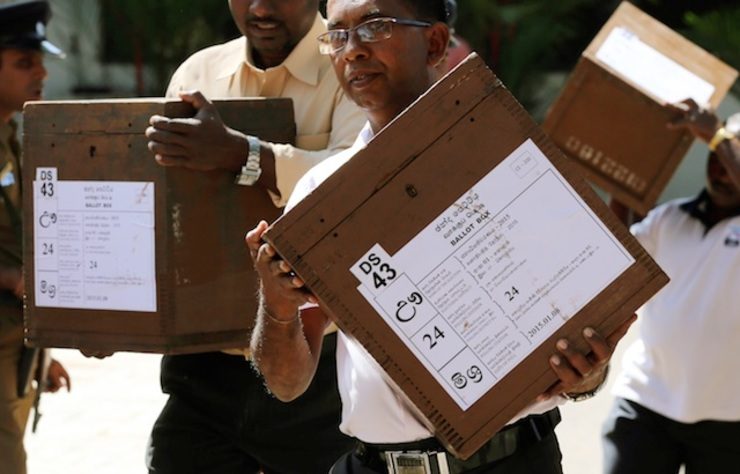SUMMARY
This is AI generated summarization, which may have errors. For context, always refer to the full article.

COLOMBO, Sri Lanka (UPDATED) – Sri Lanka went to the polls Thursday, January 8, in its tightest election in decades, with its strongman president battling for survival after accusations of corruption and a failure to bring about national reconciliation.
Mahinda Rajapakse appeared assured of victory when he called snap polls in November, seeking an unprecedented third term in office five years after crushing a violent separatist rebellion that had traumatized the country for decades.
But his health minister’s shock decision to defect from the government and stand against him led to a bitterly fought campaign for an election analysts say is too close to call.
Maithripala Sirisena was a relative unknown until he announced he was standing as the main opposition candidate, but has led a slew of defections and become a rallying point for disaffection with Rajapakse and his powerful family.
With independent monitors warning of possible voter intimidation, particularly in the Tamil-dominated north of the country, Washington urged Rajapakse to ensure the election was peaceful and credible.
Top US diplomat John Kerry spoke with the president “to underscore the government’s responsibility to ensure the January 8 elections will be free from violence and intimidation,” State Department spokeswoman Jen Psaki said.
Opposition supporters have accused the government of deploying troops to Tamil areas as part of a strategy to intimidate voters.
Rajapakse is widely detested by members of the country’s biggest minority, who account for 13% of its 15 million people.
South Asia’s longest-serving leader had appeared politically invincible after his forces crushed the Tamil Tigers in 2009 and brought peace to the island.
He won a landslide election victory in 2010, but critics say he has failed to bring about reconciliation with Sri Lanka’s Tamil minority in the years that followed.
His second term has been dogged by accusations of corruption, including undermining the independence of the judiciary and lining the pockets of political cronies through lucrative contracts.
Growing authoritarianism
Polls opened at 7 am (0130 GMT) and will continue for 9 hours under tight security, an elections department official said. There are 19 candidates in all.
With turnout expected to be high, large queues were seen outside polling stations in the constituencies of both the main candidates early Thursday.
The 69-year-old president, who has been accused of growing authoritarianism, removed the two-term limit on the presidency and gave himself more powers soon after winning his second term.
He has packed the government with relatives, sparking resentment even within his own party.
Opposition parties including the main Tamil party have rallied behind Sirisena, a 63-year-old farmer-turned-politician who, like Rajapakse, is from the majority Sinhalese community.
“Sirisena has become the symbol for those arguing for better governance in this country and anti-corruption,” said Paikiasothy Saravanamuttu, director of the Centre for Policy Alternatives think tank.
“A lot of it is him as a symbol to oust the Rajapakses, who people believe are very dangerous as far as the democratic future of the country is concerned.”
The president has taken drastic measures to shore up support, slashing fuel prices, cutting water and electricity tariffs and giving subsidized motorcycles and hefty pay increases to 1.6 million public servants.
Sri Lanka’s economy has grown by an annual average of over seven percent since the war ended, partly thanks to hefty investment from China.
But the opposition says Chinese contractors have employed few local people, and household incomes have not kept pace with national growth rates.
Rajapakse has also promised a judicial inquiry into allegations that his troops killed 40,000 Tamil civilians at the end of the civil war, although he still refuses to cooperate with a UN-mandated investigation.
The election comes days ahead of a visit to the island by Pope Francis that is expected to focus on reconciliation, and the Catholic Church has expressed concern that his visit could become politicized.
Sri Lanka is a mainly Buddhist country, but has sizable Hindu, Muslim and Christian minorities.
The independent Centre for Monitoring Election Violence (CMEV) said this week it had documented 420 incidences of violence during the campaign, with the north worst hit.
On Wednesday, police said an opposition activist had died after being hit in a drive-by shooting at a rally for Sirisena. – Rappler.com
Add a comment
How does this make you feel?
There are no comments yet. Add your comment to start the conversation.